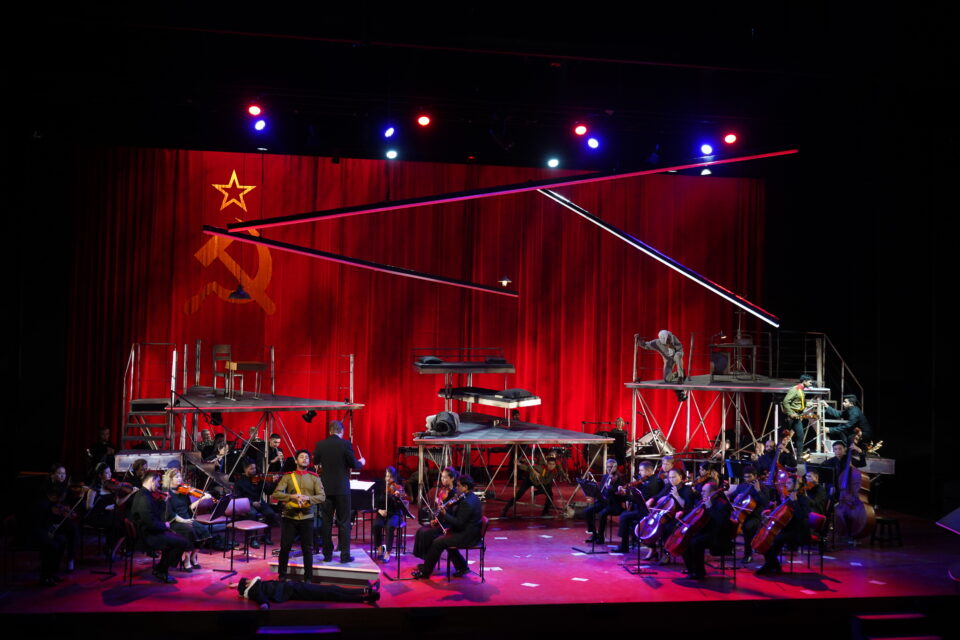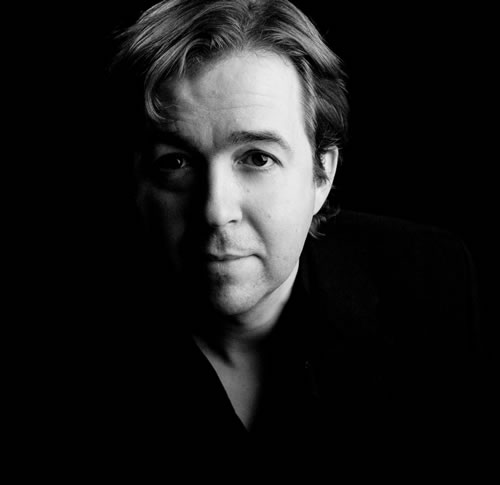When the Orchestra is a Character: Conductor Mikel Toms on Tom Stoppard’s ‘Every Good Boy Deserves Favour’
The National Centre for the Performing Arts (NCPA) in Mumbai hosts four shows this week of the play, starring Neil Bhoopalam and Denzil Smith and directed by Bruce Guthrie

Actors Neil Bhoopalam and Denzil Smith (from left to right) on stage for the play Every Good Boy Deserves Favour, at the NCPA in Mumbai.
If you ever needed a review of a play from the conductor of the music behind it, just ask Mikel Toms about his work on Tom Stoppard’s Every Good Boy Deserves Favour. “It’s crazy and funny and dark,” he says over a Zoom call about the production being staged at the National Centre for the Performing Arts (NCPA) this week in Mumbai.
Directed by Bruce Guthrie, featuring music originally composed by Andre Previn, the 65-minute play in India sees Denzil Smith and Neil Bhoopalam in lead roles. But among the most important characters, in a rare instance, are the orchestra members themselves. Toms describes the play as a perfect mix of how a story and music together enhance the narrative. Set in Soviet Russia, the premise centers on the character of a dissident named Alexander Ivanov, who has no mental illness but is deemed so after speaking up against the regime. This Ivanov ends up sharing a cell with another Ivanov, who is a genuine schizophrenic imagining he’s in a symphony orchestra, as a triangle player no less.
Originally staged in November 2022, Every Good Boy Deserves Favour returns to NCPA this month and Toms talks about what makes the whole production so special, right from having the orchestra physically interact with characters on stage to the Soviet-era inspired music that he conducts. Excerpts:
What has your experience been with this particular production in the past and what’s changing with the upcoming run of shows?
The first run of shows was amazing. It wasn’t a show that I knew before we decided to produce it. And it was fantastic. It’s essentially a very dark comedy. The music, by Andre Previn, is very much inspired and grounded in music from the Soviet period, particularly the composers, [Sergei] Prokofiev and [Dmitri] Shostakovich. A lot of what is written is pastiches by those composers. But Previn was an amazing man, he was very successful as a conductor, he was the principal conductor of the London Symphony Orchestra. He’s actually equally successful as a Hollywood film composer. So in this play, he brings those two elements together really beautifully.
It’s a very unusual setup, in that the orchestra isn’t just an accompanying body, it’s actually one of the characters in the play. It’s crazy and funny and dark. It was really quite unlike anything any of us had done before. And I think it was very new for audiences as well. We did 11 performances, sometimes two in a day, and then it was over quite quickly. I think we all felt like a lot more people would have liked to have seen it and we would also like to have done more performances. So this is what we’re doing in March. There are little musical things I’d like to do differently, mainly just tidying things up.

What were Bruce Guthrie’s directions for you throughout, considering the orchestra is a character?
It was great fun, because Ivanov, the character who supposedly has this orchestra in his subconscious mind, talks to the orchestra a lot, and also talks about the orchestra a lot. Although we don’t have any lines as such, there is a lot of reacting to what he says. He’ll insult the orchestra quite a lot. He’ll say, ‘I guess you’ve probably noticed that the cellos are really playing terribly. And so the cellos will stand up and react to that.
At one point, which is the climax of the piece, the general, who comes in and resolves the whole situation which is built up throughout the play. He throws me off the podium and starts conducting the orchestra himself. It’s great fun.
It’s like having a role in a play for you, which is entirely new, I assume?
Yeah, absolutely. I think anybody who does this play, it’s completely new for them. I think there’s nothing like this. There are lots of plays that need music and have a score written, but the orchestra is usually tucked away in the pit onto the stage, or it’s very much a separate thing from the action. Here, I think the actors had never worked so closely with an orchestra. It was very exciting for them to be able to work with musicians so closely.
Were there any liberties or interpretations that you took on for this staging?
There were quite small liberties, I think. Sometimes we have to make the music absolutely fit to what happens on stage. The actors would be speaking or something is taking place and we basically didn’t have enough music. So there are just some places where we had to lengthen the music a little bit by repeating short sections. We were pretty faithful to the score.

What kind of challenges did you face the first time around that have got ironed out this time?
The main challenge we faced as an orchestra was that we’re normally used to not having any anyone around us. It’s just us, an orchestra onstage or in a pit. In this production, we’re very closely and tightly integrated with the set. The seating of an orchestra really affects the way people can perform and the way people can hear each other and this is a really significant thing. On this set, we’re spread quite widely across and we’re slightly skewed to one side, which makes it more difficult. But we manage.
What have your experiences been with plays?
I have to say it is the first theater play that I’ve done. I’ve worked in opera in the past, which is a very different medium where the orchestra is in a pit under the stage and very separated. There’s very little direct contact between the singers and the orchestra, even though they’re working very closely together. I’m afraid I didn’t have much experience with that. But who knows? Maybe there’s the start.
There’s a real sense of exploration with this play, with the separate departments of theater and music working together quite closely. There’s a particular excitement with that. I think we all thought we need to look at this area a little more closely in future. Hopefully, it’ll lead to future collaborations.
Get tickets for ‘Every Good Boy Deserves Favour’ here.





